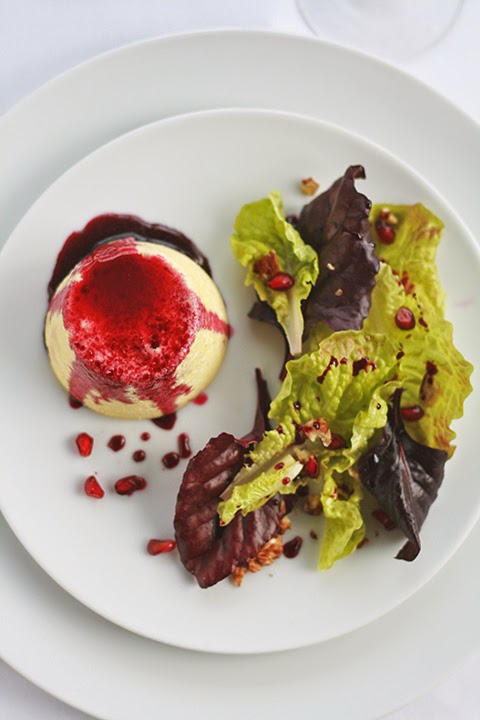Savory cheese flan, with walnuts and pomegranate sauce
Dec 17, 2014
Have you ever wondered what ancient Greek cooking would taste like? If ancient Greeks could have known that people in the future would be interested in their cuisine, they would most certainly have written down everything about their art of cooking.
During what we now call the ‘classical period’ ancient Greek civilization reached its peak. Tragic plays and Aristophanes’ comedies describe daily life including scenes around a table. Deipnosophists (from deipnon- dinner and sofos- wise) writing about the philosophic discussions taking place in rich people’s houses during gastronomic feasts described the menus in great detail. These sources inform us that Athenians had three daily meals out of which ‘’deipnon’’, late in the evening, was the last and most rich meal of the day. Dinner in modern Greece is still called ‘’deipno’’.
Their diet consisted of a great variety of fish, meat from both game and stock farming, grains such as barley and wheat and, of course vegetables, legumes and wild greens. Olive oil played the most important role in every aspect of their daily life, religious, pharmaceutical, cultural, or alimentary. Wine, a genuine Greek product, was consumed daily. Honey, initially collected from tree cavities before beekeeping methods were developed, was their sweetener. Ancient Greeks preferred a rather sweet cuisine similar to Chinese and Far East cooking today.
Of course many of the ingredients mentioned above were seasonal and accessed according to the economic and social status of citizens. I have read a few books about the ancient Greek diet and I thought that this Christmas, my inspiration should come from the flavors of our ancient cuisine.
This savory cheese flan would be an ideal first course for the Christmas season, combining flavors and textures with festive symbolism. It has a mousse-like texture that nicely compliments the crunchiness of the walnuts and the sweet and sour taste of the pomegranate sauce. Pomegranates symbolize fertility and prosperity and have always been connected with New Year’s festivities in Greece. At the moment the New Year arrives, we break open a pomegranate onto the door step for good luck throughout the year.
I wish a Merry Christmas to all of you.
Apples cooked in vanilla syrup
Dec 1, 2014
An urge to search for traditional recipes with apples resulted because of a walk we took last week near our cottage. We came across a familiar old apple tree still standing next to the ruins of a house. It has never stopped producing apples yearly for more than six decades now as my mother remembers, with no gardener’s care - just running water from a spring on the property. We hadn’t explored this corner of the village for a couple of years and we were pleased to find that the tree was still productive and that there were still some apples left for us by the birds who had already taken their share. I love that sense of déjà vu under a tree like this, imagining the repeated ritual of harvesting its fruits.
Though apples have been cultivated in Greece for many centuries yet, as far as I know, there are no recipes in Greek traditional cuisine like pies and cakes, which call for apples. They have always been the most popular year round fruit in every house pantry, but have been appreciated uncooked as a tasty fruit and a healthy snack.
Firikia (φιρίκια) a local variety of small, oval shaped apples with an intoxicating, sweet aroma and wonderful taste are the only exception to this rule. Firikia are peeled, halved and seeded, and then slow cooked in vanilla syrup with blanched almonds. This way their taste and aromas get richer and more intense. I love them as a quick dessert, paired with yogurt which balances their sweetness.
Subscribe to:
Posts (Atom)





